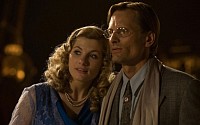 MUST
MUST  SEE
SEE
scr John Wrathall
with Viggo Mortensen, Jason Isaacs, Jodie Whittaker, Steven Mackintosh, Mark Strong, Gemma Jones, Anastasia Hille, Ruth Gemmell, Ralph Riach, Steven Elder, David de Keyser, Adrian Schiller
release US 31.Dec.08,
UK 17.Apr.09
08/UK 1h36

A moral maze: Whittaker and Mortensen



TORONTO FILM FEST
 Based on the CP Taylor play, this dark and twisted drama examines how easy it is to have strong ethical standards whittled quietly away without you even noticing. And solid filmmaking and acting make it deeply unsettling.
Based on the CP Taylor play, this dark and twisted drama examines how easy it is to have strong ethical standards whittled quietly away without you even noticing. And solid filmmaking and acting make it deeply unsettling.
John Halder (Mortensen) is a writer and professor who in the 1930s realises that, to keep his job, he may have to join the Nazi party, which he despises. He rationalises this as a necessity, and works to protect his Jewish best friend Maurice (Isaacs) from trouble. He's also dealing with problems in his marriage to Helen (Hille), while his mother (Jones) slips into senility and an attractive young student (Whittaker) catches his eye and encourages him to further his career. With these kinds of distractions, he barely notices what he's becoming.
This is an intelligent, involving dramatic fable that's cleverly shot and edited to keep us wondering where it's heading. Watching the rise of the Nazis is extremely chilling, as they target groups they see as dangerous to society and begin the cleansing process through things like book burnings. We can understand why this would repulse a writer-professor, and yet the party officials appeal to his sense of morality, asking him to write a paper on euthanasia, which he'd dealt with in one of his novels. And this subtle shift from fiction to reality is the tip of the iceberg.
Mortensen captures this moral murkiness with a beautiful performance that gets deep beneath Halder's skin. We can readily identify with his frazzled life, caring for his mother while dealing with his difficult wife and this sexy student. And his scenes with the terrific Isaacs bristle with both camaraderie and anger, all accompanied by a nagging fear that things are spiralling out of control.
By the time the story arrives in the 1940s, we can see how Halder has changed, and it's thoroughly chilling. He's fairly shocked himself, even though he has arrived at this point through a series of baby steps, small compromises and seemingly unimportant decisions combined with the delusion that he can control how much of his soul he sells to the devil. This isn't gritty realism; it's a morality tale, and it's made with quiet passion and real power.
 |
themes, language, violence, innuendo | 19.Jan.09 |

 Still waiting for your comments ... don't be shy.
Still waiting for your comments ... don't be shy.
HOME | REVIEWS | NEWS | FESTIVAL | AWARDS | Q&A | ABOUT | TALKBACK